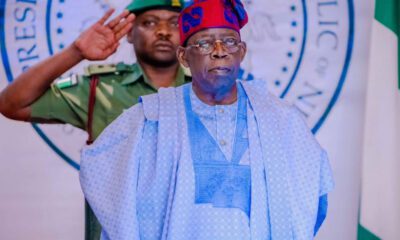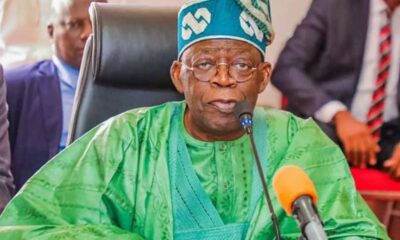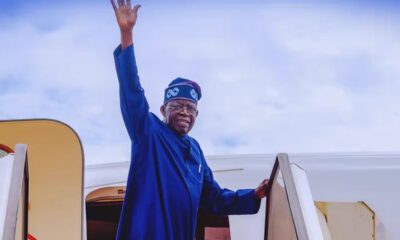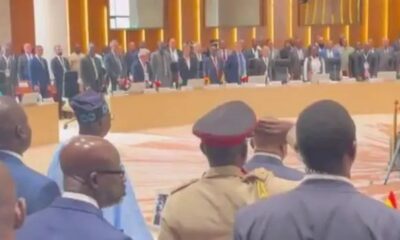Top Story
Tribunal contest: Tinubu objects to petition for run-off election, says Atiku is a ‘serial loser’
…Says prayer ungrantable
…He lost most of his supporters while crisscrossing, divided his party — President-elect says
By Moses Adeniyi
As the legal contest challenging his declaration as the winner of the February 25 presidential election rolls up, President-elect, Asiwaju Bola Tinubu, has described the petition for a run-off of the presidential polls as ungrantable, knocking his closest rival, the candidate of the Peoples Democratic Party (PDP), Atiku Abubakar a serial loser who has been losing since the return to democracy in 1993.
The President-elect in response to the petition filed by the PDP, and its candidate, Atiku before the Presidential Election Petition Tribunal Court (PEPC) seeking to nullify his election, said given Atiku’s antecedents of losing elections successively, it should not be a surprise, nor an accident that the electorate again rejected him at the polls on 25th February, 2023.
Tinubu, in a preliminary objection he entered before the PEPC, in Abuja, described the PDP candidate as a consistent loser that had since 1993, crisscrossed different political parties, in search of power.
He noted in the process he filed through his team of lawyers led by Chief Wole Olanipekun, SAN, that in the process of crisscrossing from one party to another, Atiku lost most of his followers.
He said he would during the hearing of the petition, lead evidence before the court to show how Atiku’s emergence as a candidate in the presidential election that held on February 25, led to the “balkanisation” of the opposition PDP.
“The 1st petitioner (Atiku) has been consistently contesting and losing successive presidential elections in Nigeria since 1993, whether at the party primary election level or at the general election; including 1993, when he lost the Social Democratic Party (SDP) primary election to the late Chief M.K.O Abiola; 2007, when he lost the presidential election to the late President Umaru Musa Yar’Adua; 2011, when he lost the Peoples Democratic Party presidential primary election to President Goodluck Jonathan; 2015, when he lost the APC primary election to President Muhammadu Buhari; 2019, when he lost the presidential election to President Muhammadu Buhari; and now, 2023, when he has again, lost the presidential election to the respondent.
“Further to (iv) supra, it was/is not a surprise and/or not by accident that the electorate rejected the 1st petitioner at the polls of the presidential election held on 25th February, 2023,” he said in his objection.
Tinubu who insisted that he was validly returned as winner of the presidential election by the Independent National Electoral Commission (INEC) argued before the court that unlike Atiku, he has been “a most consistent politician, who has not shifted political tendency and alignment.”
“The 1st petitioner (Atiku) has consistently crisscrossed different political parties of Nigeria, including being a member of the PDP, before joining the Action Congress in 2007, when he was the presidential candidate of the party; returned to the PDP thereafter, before joining the 3rd respondent in 2015, where he contested the primary election with President Muhammadu Buhari, before returning to the PDP in 2019 to emerge as its presidential candidate.
“Arising from paragraph 9 supra, while the respondent has always carried his supporters along and increased his political followership, the 1st petitioner has lost most of his followers in the process of moving from one political party to the other.
“The emergence of the 1st petitioner as the presidential candidate of the 2nd petitioner led to irreconcilable hostilities within the ranks of the 2nd petitioner, causing the emergence of a group of Governors known all over the country as the G-5 Governors- Rivers, Oyo, Enugu, Abia and Benue, who opposed the 1st petitioner and vowed to mobilise their people against him.
“The respondent shall at the trial, found and rely on copies of newspaper publications and social media contents in respect of the said subject,” he noted.
He further argued that while the 1st petitioner contested the presidential election of 2019 with President Muhammadu Buhari under a fairly cohesive Peoples Democratic Party with Peter Gregory Obi as his running mate and Rabiu Musa Kwankwaso as one of his supporters, the same Obi broke away from the PDP to join the Labour Party to contest the presidential election of 25th February, 2023, while Kwankwaso also broke away from PDP to contest the presidential election on the ticket of the New Nigeria People’s Party.
“While Peter Obi polled a total number of 6,101,533, Rabiu Musa Kwankwaso polled 1,496,687.
“Before the balkanisation of the 2nd petitioner, the South-Eastern States of Enugu, Abia, Imo, Ebonyi and Anambra used to be controlled by the 2nd petitioner, but at the presidential election of 25th February, 2023, they all went the way of Labour Party,” he argued.
Tinubu mentioned that his party, the All Progressives Congress (APC), is a national party, popular amongst Nigerians, cutting across all divides, arguing that the PDP, on the other hand, had in recent years, “been engrossed in intra-party irreconcilable feuds and infighting, both in relation to its national offices and officers, as well as the Convention which produced the 1st petitioner as its presidential candidate.”
“Presently (and/or) from 2015 till date, the 3rd respondent has been the political party in power in Nigeria; it presently has the President of the country, 20 State Governors, 64 Senators, 217 members of the House of Representatives and about 600 members of the States’ Houses of Assembly, nationwide; while the 2nd petitioner has just 14 State Governors, 39 Senators and 111 Members of the House of Representatives.
“In the election that held on 25th February, 2023 and 18th March, 2023, while the 3rd respondent produced 15 Governors, as against 9 of the 2nd petitioner, it also produced 64 Senators, as against 33 produced by the 2nd petitioner, and 217 Representatives, as against 104 produced by the 2nd petitioner.
“The respondent will lead evidence to prove and demonstrate that from 1999 till date, it has been the consistent pattern that the political party who controlled/controls most of the States as well as the National and State Assemblies produced/produce the President, and that the election of 25th February, 2023 was no exception.
“This is asides the misfortune and calamities that have befallen the 2nd petitioner in recent years, even till after the election, where they had to sack their National Chairman. The respondent shall found and rely on documents and newspaper reports of the various squabbles in the 2nd petitioner.
“In reaction to paragraphs 3 and 4 of the petition, the respondent asserts that the 2nd petitioner has lost its relevance and popularity within its own ranks and amongst Nigerians leading to abysmal electoral performance.
“Therefore, at the National Assembly election conducted on the same day as the 2023 presidential election, the 2nd petitioner only won thirty-three (33) out of the One Hundred and Nine (109) Senatorial seats and about 100 out of the Three Hundred and Sixty (360) seats in the House of Representatives.
“Further to 21 above, the fortune of the 2nd petitioner has also dwindled with regard to the number of governors produced by it.
“In the 2023 election cycle, the said 2nd petitioner was only able to win 9 governorship seats. The 2nd petitioner’s electoral reputation is contrary to that of the 3rd respondent which has, in the past three election cycles in Nigeria, apart from winning the presidential elections also maintained an emphatic majority in both chambers of the National Assembly as well as a majority of states across Nigeria,” he argued.
Tinubu told the court that though Atiku raised allegations against election results from States that were won by both Obi of the LP, and Kwankwaso of the NNPP, he however failed to join them as necessary and desirable parties in the petition.
“Without prejudice to paragraph (v) supra, the petitioners (Atiku and PDP) are also querying the result of elections in all the States where they won the election, including but not limited to Adamawa, Bauchi, Akwa-Ibom, Bayelsa, Gombe, Yobe, Sokoto, Osun, Kebbi and Katsina States, without making themselves co-respondents to the petition; whereas, under section 133(2) of the Electoral Act, 2022, a party whose election is being challenged shall be made a respondent,” Tinubu argued.
He further argued that the petition constituted a gross abuse of the judicial process, noting that six PDP controlled States had three days after the presidential election, filed a suit before the Supreme Court to nullify the outcome.
He alleged that Atiku sponsored the suit before the apex court which had among other things, accused INEC of sidelining its Regulations and Guidelines for the Conduct of Elections, 2022, by its failure to use the Bimodal Voter Accreditation System (BVAS) to electronically transmit election results.
“The petitioners herein, through themselves and/or their proxies filed the Originating Summons at the Supreme Court, before filing this petition.
“The petitioners are maintaining two processes in respect of the same subject and/or complaint of theirs, against the conduct of the presidential election held on 25th February, 2023.
“This latter petition is abusive of the Originating Summons filed at the Supreme Court and is liable to be dismissed in limine,” he argued.
On the claim that he did not secure the statutory vote from the Federal Capital Territory, FCT, Abuja, Tinubu argued that it was not a mandatory requirement of the law that he must win the FCT before he would be declared as the President-elect.
He said Atiku’s call for his election to be nullified on the ground that he was mandatorily required to score one-quarter of the lawful votes cast in each of at least two-thirds of all the States and the FCT, “becomes suspect and abusive, when considered vis-à-vis relief 150(d), where the petitioners pray that the 1st petitioner who did not score one-quarter of the votes cast in more than 21 States and the FCT, Abuja, be declared the winner of the election and sworn in as the duly elected President of Nigeria.”
He described as ungrantable, Atiku’s alternative prayer for the INEC to be directed to conduct a second election (run-off) between two of them, noting that the request was not premised on any predicate declaratory relief.
“The further alternative relief 150 (f), which reads thus: ‘that the election to the office of President of Nigeria held on 25th February, 2023 be nullified and a fresh (re-run) ordered’ is ungrantable, as:
“This Honourable Court has no jurisdiction, whether under the Constitution or the Electoral Act.
“The court can only order a run-off election, between the candidate declared as winner and the first runner-up, in appropriate cases (not in a case like the election of 25th February, 2023) as provided for under section 134 (3) of the Constitution. The said relief is at large,” he said.
Having laid his objection, he prayed the court to not only strike out paragraphs 19 to 150 of the petition for being “nebulous, inchoate, imprecise, incompetent, generic and vague”, but to dismiss the entire case for failure of the petitioners to establish a reasonable cause of action against his election victory.
“Shorn of all hype, hyperbole, grandstanding and frivolities, the petition has no substance in fact, logic and law, as well as disclosing no reasonable cause of action. It deserves to be summarily dismissed, as same constitutes a crass abuse of the judicial process,” Tinubu objected before the court.
Recall Atiku came second on the Feb. 25 presidential election, while Obi of the LP came third in the polls, but both have filed their petition seeking the court to nullify the declaration of the Tinubu as winner and President-elect
Tinubu has earlier in response to Obi’s petition argued before the PEPTC that
Recall that the the APC had earlier in defending the eligibility and victory of Tinubu argued before the PEPC that the forfeiture of the sum of $460,000 by Tinubu, its candidate in the February 25 presidential election, to the government of the United States of America (USA) in 1993 was not sufficient ground to disqualify him from contesting the election.
The forfeiture of the said sum has formed one, among other grounds in the cases filed by opposition candidates and their parties petitioned against Tinubu for which they argued he should be considered ineligible for the presidential contest.
The ruling party, however, in processes it filed to defend the outcome of the presidential election which its candidate won, maintained that Tinubu, merely surrendered funds in 10 bank accounts that were opened in either his name or that of Compass Finance and Investment Co.
It argued before the PEPC sitting at the Court of Appeal in Abuja, that funds in the said accounts, which were domiciled in both First Heritage Bank and Citi Bank N. A, were subject to a civil forfeiture proceeding in Case No: 93C4483.
The APC stated that the purported decision of the United State District Court Northern District of Illinois, Eastern division in the said case, was not a fine but a decree of forfeiture of the amount of $460,000 to the United States pursuant to the settlement of claim by the parties to the case.
“The said decision is not against the 2nd Respondent (Tinubu) but against the funds in the various account opened in the name of Bola Tinubu with First Heritage Bank and City Bank N.A.
“The compromise terms that led to the forfeiture were preceded by express admission on record that the 2nd Respondent did not admit the commission of any drug, drug-related or illicit conduct of dishonesty or fraud that fits into any of the grounds of disqualification to contest for office of president of Nigeria at the 25th February, 2023 general election,” the APC argued.
While praying the court to strike out petitions against Tinubu, the APC argued that Mr. Peter Obi, the presidential candidate of the Labour Party (LP), who alleged that Tinubu was convicted for a drug-related case, lacked the requisite locus standi to challenge the outcome of the presidential election.
It argued on the ground that Obi was not validly nominated by the LP, stressing that he was not a member of the party, at least 30 days before it conducted its presidential primary election.
It told the court that Obi was a member of the Peoples Democratic Party (PDP), till May 24 2022, adding that he was screened as a presidential aspirant of the party in April, 2022.
APC further averred that whereas Obi joined the LP on May 27, he was subsequently declared the winner of the presidential primary election the LP held on May 30, 2022.
“By section 77(3) of the Electoral Act, 2022, the 2nd Petitioner (LP) is mandated to have submitted its comprehensive register of members to the 1st Respondent 30 days before its presidential primary.
“That is to say the said register of members must have been submitted to the 1st Respondent on or before 30th April, 2022.
“The 1st Petitioner (Obi) as at 30th April, 2022 was still a member of the PDP and his name was not and could not have been in the register of members submitted by the 2nd Petitioner to 1st Respondent (INEC).
“The Petition herein is incompetent as the 1st Petitioner is not a member of the 2nd Petitioner since the 1st Petitioner’s name is not, and could have been listed in the list of the register made available by the 2nd Petitioner to the 1st Respondent, same having been made available before the 1st Petitioner joined the 2nd Petitioner,” it argued.
It, therefore, prayed the court to dismiss or strike out Obi’s petition “wholly or in part as may be approppriate.”
Top Story
Again, Dangote Refinery crashes diesel, aviation fuel prices


…Pegs N940, N980/ltr respectively
…As FG unveils initiatives to attract $10bn investments in 18 months
…NNPC Ltd/Newcross resume production at Awoba field
In an unprecedented move, the Dangote Refinery has further lowered the price of Diesel and Aviation fuel.
This is coming seven days after the refinery crashed the price of Diesel to N1,000. Previously, the Refinery had three weeks ago while rolling out the products supplied at a substantially reduced price of N1,200 per litre.
This marks the third major reduction in diesel price in less than three weeks when the product sold at N1,700 to N1,200 and also a further reduction to N1,000 and now N940 for diesel and N980 for aviation fuel per litre.
The new price was made known in a statement made available to Nigerian NewsDirect on Tuesday.
The price change of N940 is applicable to customers buying five million litres and above from the refinery, while the price of N970 is for customers buying one million litres and above.
Speaking on the new development, the Head of Communication, Mr Anthony Chiejina, explained that the new price is in consonance with the company’s commitment to cushion the effect of economic hardship in Nigeria.
“I can confirm to you that Dangote Petroleum Refinery has entered a strategic partnership with MRS Oil and Gas stations, to ensure that consumers get to buy fuel at affordable price, in all their stations be it Lagos or Maiduguri. You can buy as low as 1 litre of diesel at N1,050 and aviation fuel at N980 at all major airports where MRS operates.”
He further stated that the partnership will be extended to other major oil marketers.
“The essence of this is to ensure that retail buyers do not buy at exorbitant prices.
“The Dangote Group is committed to ensuring that Nigerians have better welfare and as such, we are happy to announce these new prices and hope that it would go a long way to cushion the effect of economic challenges in the country.”
Nigerian President Bola Tinubu had also commended Mr Dangote for the initial price reduction, describing it as an “enterprising feat.”
Reacting to the latest development, The Director General of the Manufacturers Association of Nigeria (MAN), Mr Ajayi Kadiri, said that “The decision of Dangote Refinery to first crash the price from about N1,750/litre to N1,200/litre, N1,000/litre and now N940 is an eloquent demonstration of the capacity of local industries to positively impact the fortunes of the national economy.”
He added that, “The trickle down effect of this singular intervention promises to change the dynamics in the energy cost equation of the country, in the midst of inadequate and rising cost of electricity.
“The reduction will have far-reaching effects in critical sectors like industrial operations, transportation, logistics, and agriculture, contributing to easing the high inflation rate in the country; a lot of companies will be back in operation.”
…NNPC Ltd, Newcross resume production at Awoba Field
In the same vein, the Nigerian National Petroleum Company Limited (NNPC Ltd) and its Joint Venture partner in the Awoba Unit Field, Newcross Exploration and Production Ltd, have restarted production from the Awoba field.
The Awoba Field was earlier shut down in February 2022 due to evacuation issues and crude oil theft and hasn’t contributed to the nation’s oil production since 2021.
The oil production in Nigeria has been experiencing significant decline with the latest being 1.32 million barrels per day in February to 1.23 in March, according to data from the Organisation of Petroleum Exporting Countries (OPEC)’s latest monthly oil market report.
The NNPC Ltd in a statement on Tuesday however disclosed that it commenced production on the field on April 13, 2024 as part of its efforts to boost the production efforts in the country.
It noted that production from the field has averaged 8,000 barrels per day and is expected to plateau at 12,000 per day at full ramp up within 30 days.
Awoba is also expected to significantly boost gas supply to the power sector and other gas-based industries.
The Awoba Unit which straddles OMLs 18 and 24 is located in the mangrove swamp south of Port Harcourt, Rivers State. Both OML 18 and OML 24 assets are under the management of the NNPC Upstream Investment Management Services (NUIMS).
NNPC Ltd has been recording a string of production successes from the JV portfolio which have significantly lifted overall national production. Besides the recent start of production at the Madu Field by the NNPC Ltd/First E&P JV, the company has achieved the restart of production at OMLs 29 and OML 18 in late 2023 which have steadily contributed an average of 60,000bpd to the nation’s production output since their restart.
Speaking on the development, the Group Chief Executive Officer, Mallam Mele Kyari, ascribed the achievement to the President Bola Ahmed Tinubu administration’s success in providing an enabling operating environment for businesses to thrive.
He expressed appreciation to all stakeholders (staff, operators, host communities, government security agencies, and private security contractors) who played a pivotal role in achieving the feat.
…FG unveils initiatives to attract $10bn investments in 18 months
In a move to further revitalise the oil and gas industry’s contribution to the Nigerian Economy, Minister of Finance and Coordinating Minister of the Economy, Wale Edun, presided over a signing ceremony at the Federal Ministry of Finance headquarters in Abuja endorsing the Consolidated Guidelines for the implementation of Fiscal Incentives for the Oil & Gas Sector – a cornerstone of the Presidential Directive aimed at enhancing the Nigerian oil & gas sector’s global competitiveness whilst stimulating economic growth.
As disclosed during the signing, the Presidential Directives were developed and coordinated by the Special Adviser to the President on Energy, Mrs. Olu Verheijen to ensure a competitive framework for the Nigerian oil & gas industry. These Consolidated guidelines for the fiscal incentives are based on extensive collaboration across Finance and Petroleum Ministries and involved several key regulatory bodies including the Federal Inland Revenue Service (FIRS), the Nigerian Upstream Petroleum Regulatory Commission (NUPRC), and the Nigerian Midstream and Downstream Petroleum Regulatory Authority (NMDPRA).
According to Mrs. Verheijen, these new measures have been designed to deliver a competitive Internal Rate of Return (IRR) for Oil & Gas Projects and attract over $10 billion in new investments within the next 12-18 months. They also underscore Nigeria’s commitment to reaching its long term oil production target of 4 million barrels per day whilst enhancing the reliability of gas supply to boost export earnings and fuel Nigeria’s industrialization.
Mrs. Verheijen disclosed that among the guidelines signed were the NUPRC Guideline on Hydrocarbon Liquids Content in a Non-Associated Gas (NAG) Field, essential for accurately categorising and quantifying the hydrocarbon liquid content in these fields. Additional guidelines focused on the applicability of tax credits and allowances for Non-Associated Gas Greenfield Development and the Midstream Capital and Gas Utilization Allowance, providing taxpayers with clarity on the computation of these benefits.
HM Edun, in his remarks, thanked President Bola Ahmed Tinubu for signing the directive in February 2024 to engender growth in the Nigerian oil and gas sector, which had stagnated for over the last decade.
He also emphasised the potential of the guidelines, saying, “The idea is to create an atmosphere conducive to international competitiveness such that investment comes in. And in this case, we know it’s foreign direct investment.”
The signing ceremony was attended by various stakeholders, including NNPC Limited, Oil Producers Trade Section (OPTS) and the Independent Petroleum Producers Group (IPPG), further highlighting Nigeria’s unified approach toward reinvigorating its oil and gas sector.
Top Story
Lokpobiri, Wabote disagree on utilisation of over $500m Nigerian Content Fund
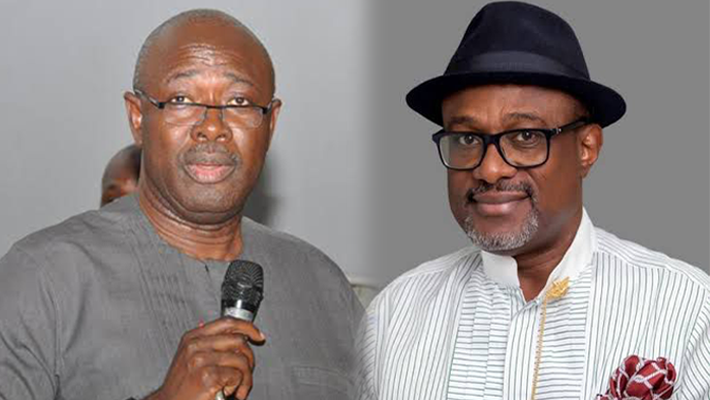

…as Former NCDMB ES accuses Minister of interference, politically motivated actions on NCDMB
The Minister of State For Petroleum Resources (Oil), Sen. Heineken Lokpobiri and the former Executive Secretary of the Nigerian Content Development and Monitoring Board (NCDMB), Engr. Simbi Kesiye Wabote are at loggerheads over the utilisation of the Nigerian Content Fund.
Speaking recently at a dinner organised by the Petroleum Club in Lagos, Lokpobiri advised the NCDMB against wasting over $500 million of the fund on unprofitable ventures.
Responding to the Minister in a statement, Wabote accused the Lokpobiri of peddling false narratives against himself and the agency following his failure to trample on the agency.
Wabote accused the Minister of making a demand of N30 billion for his position as Chairman of the NCDMB board.
Narrating his ordeal, the former NCDMB ES said, “My problem as ES started with Lokpobiri in December 2023 when he sent one of his undocumented aides within his Ministry to my office in Yenagoa (Blackson) requesting me to increase NCDMB budget by N30 billion for the Office of the Minister and I said it had never been done before. I served two Ministers and none of them have ever made such a request to NCDMB, that we only make provision for the office of the Chairman of the council which covers his travel expenses.
“I said to him that the maximum NCDMB budget has ever gotten to in the past is circa N80 billion for all our activities, adding N30 billion will be too much for his office and I was not going to do it. I ask stakeholders to review the NCDMB budget from 2016 to 2023 and also look at what got approved in 2024.
“In August 2023, I had led the management of NCDMB to provide a full briefing of the Board’s activities to Mr. Lokpobiri and the Hon Minister of State for Petroleum – Gas (HMSPR-Gas) Hon Ekperikpe Ekpo. The presentation, in more than 250-page slides, provided information on the status of the Board’s projects, partnerships, interventions funds, TSA account balances, HCD programs, Forensic Audits, and other strategic initiatives under the NCDMB 10-year Strategic Roadmap.
“The presentation was followed up with an invitation to the Honourable Ministers of State to embark on familiarisation visits to the Boards headquarters and other project sites located across the country.”
Wabote further accused Lokpobiri of being reckless and peddling bundles of lies.
“I wish to state that his reckless statements in the past months are not new to me. As only recently he tried to throw NNPC Ltd under the bus as he stated that Nigeria is losing 400bpd of oil because of not signing the Seplat deal thus trying to indict NNPC Ltd as a parastatal under his supervision. As a Minister and a representative of the substantive minister, are you not supposed to canvass government positions or represent your principal correctly? Rather he chooses to act like a militant activist.
The erstwhile ES noted that the Minister visited the following sites between September and November 2023: Nigerian Content Tower – the Board’s headquarters in Yenagoa; NCDMB Fire Station in NCT; 204-room NCDMB Conference Hotel under construction; NCDMB Creche; NCDMB NOGAPS Industrial Park, Emeyal-1, near Otueke, Bayelsa State; Waltersmith Refinery, Ibigwe, Imo State; NCDMB Interventions within the PTDF Skills Center in Omagwa, PHC.
“Familiarisation visits to other sites were lined up before my unceremonious removal from office right after our flagship event, Practical Nigerian Content (PNC) Forum in December 2023.
“While I have moved on from the unsavory incident, I never knew that the HMSPR-Oil lacked any understanding of the brief I had given to him complete with necessary facts and figures or prefers to broadcast mischief to industry stakeholders.
“We had told Mr. Lokpobiri that our projects, interventions, and partnerships were driven by the enabling provisions contained in the NOGICD Act and extant government policies on modular refineries, Decade of Gas, jobs creation, and poverty eradication.
“It is therefore shocking that the HMSPR-Oil chose to present false narratives before the Petroleum Club in his foray into character assassination, treachery and ‘waste’ agenda.
“It is false for the HMSPR-Oil to assert that 90 percent of the NC Intervention Fund managed by BOI is not performing. He was fully briefed that it is because NCDMB is not a bank that made us partner with BOI as a foremost development bank in the country to manage the intervention fund for the oil and gas industry with each loan secured by Bank guarantee.
“As at Dec 2023, it is on record that the NC intervention funds managed by Bank of Industry (BoI) helped cushion the effects of the COVID-19 pandemic in the industry and that the fund has yielded millions from the low interest rates with the principal fully secured with Bank Guarantee (BG). The fund was intact when I left office as can be verified from BOI. If the fund is now being declared as ‘wasted,’ by the HMSPR-Oil, he should be asked what he has done, or intends to do with the fund, to make such a declaration. Industry watchers must not allow the secured funds to be diverted under any pretext.
“Our presentation and briefing notes to the HMSPR-Oil on Brass Fertiliser clearly informed him that the partnership arrangement with NNPC and DSV Engineering is for the establishment of 10,000TPD Methanol plant. It is therefore false that the partnership was for a ‘fertiliser factory.’
“Perhaps, Mr. Lokpobiri should have checked with the Hon Ekperikpe Ekpo, the Hon Min of State for Petroleum Resources (Gas) and NNPC Ltd for details of the project and the latest developments rather than the false accusations to castigate NCDMB.
“For the record, the initial investments by NNPC and NCDMB are pre-FID equity injection for the estimated $3.2billion project. The Board’s additional investment is tied to achievement of financial close which has not been achieved by the project promoters.
“The status of the fifteen (15) Board’s partnerships can be grouped into 5 categories as follows:
“(2) commissioned and operational (Waltersmith); Butane Energy (Katsina State) and expanding to 9 northern states;
“Five (4) ready for commissioning (NEDOGAS – operational and paid $1m ROI to NCDMB), BetterGas, Bunorr, and Duport);
“Four (4) under construction (Azikel, Triansel, Eraskon, and LadolPower;
“Four (4) in search of debt financing (Brass Fertiliser (Methanol), Rungas Prime, Rungas Alfa, and SPL Utorogu).
“One (1) under divestment considerat (Atlantic Refinery).”
Wabote further challenged the Minister to visit the construction sites to avail himself of facts on ground.
“He should also check the MPR archives of the strategic plan to diversify oil and gas development clusters in the Niger Delta using Bonny Island, Brass Island, Onne, Ogidigben, Ibom, etc. Perhaps, this will cure his aversion to any developmental initiative in Brass Island and the Niger Delta in general,” Wabote said.
“The HMSPR-Oil should learn to separate the requirements of the office he currently occupies from his political ambition. He should look for another individual and agency of government to demonise in his quest to remain relevant. I am also aware that he is fighting a proxy war with his one time principal (former MSPR) and only using me as a decor.
“I strongly recommend that HMSPR-Oil channels his energy to position himself as the Guest of Honour and allow the Board to commission the following partnership projects as part of the first year anniversary of President Bola Tinubu.
“Nedo Gas Processing Plant complete with 300MMscf gas gathering hub in Kwale, Delta State, Better Gas 500MT LPG Storage and distribution infrastructure at Dikko near Abuja, 48,000 Litre per day Bunnor Base Oil Production at Omagwa, PHC, Butane LPG Plant Kaduna (2nd plant after the Katsina Plant commissioned in December 2021) and the Duport Modular Refinery, Egbokor (Legal squabbles permitting),” Wabote enumerated.
“Per the plan in place before my exit from office, another set would be ready for commissioning by the 2nd year anniversary of Mr. President if the HMSPR-Oil will allow the Board to function without all the lethargy of woes he has brought to NCDMB since December 2023,” Wabote concluded.
Reacting again, the Minister vowed to recoup alleged moribund investments worth over $500 million made by the Nigerian Content Monitoring and Development Board (NCDMB).
The Minister made this vow in defence of his allegation that the NCDMB wasted over $500 million of the industry’s fund in equity investments in private establishments and in loans that are now non-performing.
Reacting to Wabote’s statement, the Minister through his SA Media and Communication, Nneamaka Okafor, described Wabote’s claims as blatant lies from the pit of hell.
The Minister’s response read: “Our position is that he who alleges must prove same. So, if Mr. Wabote has proof of such conversation, he is challenged to provide same.”
“Secondly the Minister has no aide called Blackson. All his aides were duly selected in line with extant laws and have documents to that effect.
“The Minister in his capacity as chairman of the Governing Council stands by his statement at The Petroleum Club’s quarterly event in Lagos, and as journalists I welcome you to visit the places mentioned to verify the allegations for yourself.
“Thirdly, the said Atlantic Refinery was supposed to be built in Mr Wabote’s hometown, he should show Nigerians where that refinery is.
“Fourthly, the Brass Fertilizer and Petrochemical company was also paid for, you are welcomed to also visit the site to verify the facts for yourself.
“Let me add that these revelations are not new, they were first made during an investigative hearing of the House of representative committee on local content. Again the records are there and you are welcome to verify these facts.
“The Minister has never been part of any budgeting process of any parastatal under the Ministry, you are welcomed to visit these agencies to verify for yourself.
“Finally, the Minister’s office is run with a budget superintended by the permanent secretary and so one will wonder how the Minister will ask another entity to make provisions for the budget of his Office. The Minister has an impeccable record from his time as Minister of Agric and will continue to stand for the truth.
‘’I have had course to read Mr Wabote’s release and everyone can see that he is still nursing the wounds of being replaced even after spending seven years at the Board. At best, this is a clear case of when you fight corruption, corruption will fight back,” the response read.
The Minister also disclosed that investigations are ongoing while making a vow to recover the resources expended.
Top Story
Again, CBN sells FX to BDCs at N1,021/USD
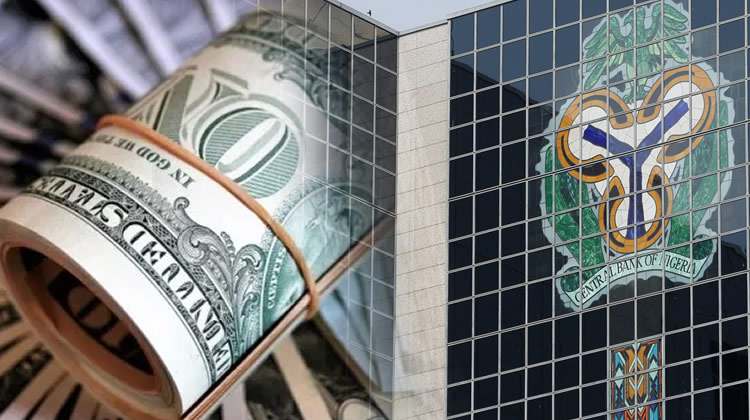

The Central Bank of Nigeria has approved the sale of an additional $10,000 each to 1,583 eligible Bureaux De Change (BDCs) in the country to meet market demands.
The Director, Trade and Exchange Department of the CBN, Dr Hassan Mahmud, made this known in a letter addressed to the President, Association of Bureau De Change Operators of Nigeria (ABCON) on Tuesday in Abuja.
Mahmud said that the CBN would sell to the BDCs at the rate of N1, 021 to a dollar.
“The BDCs are in turn to sell to eligible end users at a spread of not more than 1.5 per cent above the purchase price,” he said.
He directed all eligible BDCs to commence payment of Naira deposit to some designated CBN Naira deposit account numbers.
“All BDCs are advised to continue to abide by the rules and conditions as stipulated in our earlier operational guidelines,” he said.
The apex bank had earlier, on April 8, approved the sale of $10,000 to 1,588 eligible BDCs operators at the rate of N1,101 to the dollar.
The approvals are part of CBN’s intervention in the foreign exchange market to improve liquidity and stabilise the Naira.
-
Finance3 months ago
Court orders Sen. Victor Umeh to repay N136m bank debt to AMCON
-



 Abuja Update2 months ago
Abuja Update2 months agoUNDP, FG partnership needed to achieve inclusion, equity- Minister
-
Abuja Update1 month ago
Banks drive stock market performance with N147bn gain
-



 Infotech3 weeks ago
Infotech3 weeks agoWorld Backup Day: NITDA urges Nigerians to ensure backup of data
-
capital market2 years ago
Rt.briscoe, FBNH, Others halts negative performance of stock market
-



 Health2 weeks ago
Health2 weeks agoImmunisation: FG, GAVI seek synergy with Sokoto Govt.
-
Infotech2 weeks ago
Forex for Beginners: Unveiling the currency exchange and how to trade it
-
Submission Guidelines4 months ago
CALL FOR SUBMISSIONS: POETRY COLUMN-NND

